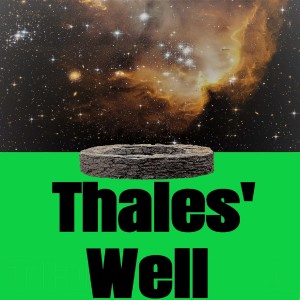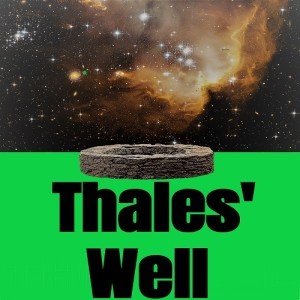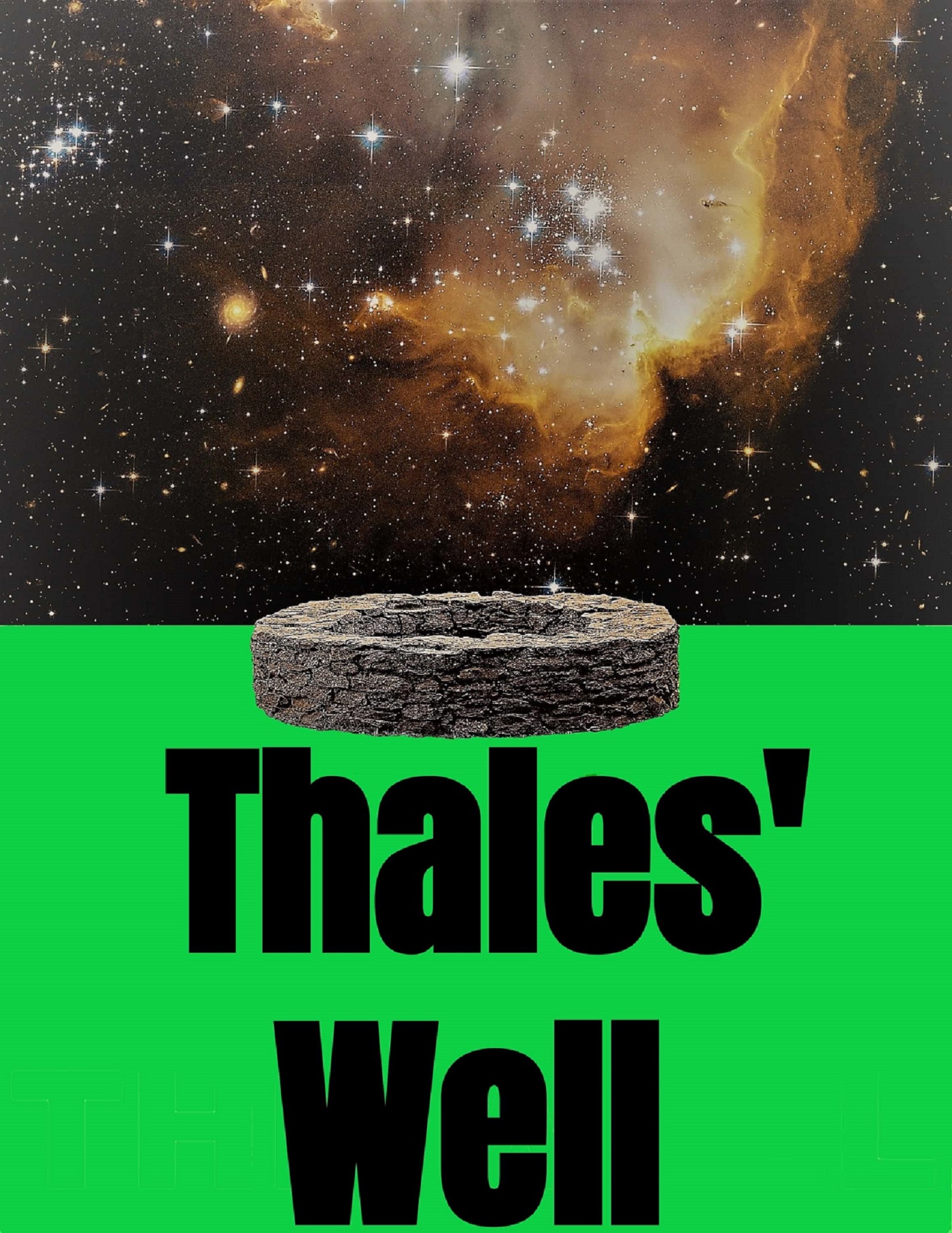Episodes

Wednesday Apr 21, 2021
On David Lewis and Possible Worlds with Ben Curtis
Wednesday Apr 21, 2021
Wednesday Apr 21, 2021
On this episode, I discuss analytic philosopher David Lewis' concept of possible worlds with Dr Benjamin Curtis. Ben is colleague at Nottingham Trent University. We talked about possible worlds, actual worlds, probability, causation and time.
Ben Curtis lectures in Philosophy at Nottingham Trent University. He has published on a wide-variety of themes including epistemology, bioethics, time as well as the philosophical status of antiques. You can find out more about Ben on his university webpage here. Ben has also contributed a number of pieces to The Conversation which you can find here.
You can listen to more free back content from the Thales' Well podcast on TuneIn Radio, Player Fm, Stitcher and Podbean. You can also download their apps to your smart phone and listen via there. You can also subscribe for free on iTunes. Please leave a nice review.

Wednesday May 06, 2020
On Camus and 'The Plague' with Robert Zaretsky
Wednesday May 06, 2020
Wednesday May 06, 2020
I had an amazing conversation with Robert Zaretsky who is a Professor of Humanities at the Honors College, University of Houston. We spoke about French novelist and philosopher Albert Camus and his great pandemic novel The Plague. The Plague is currently receiving renewed critical attention due to the Covid-19 pandemic and is set to be re-issued by Penguin. Thus, I thought it would be a good time to discuss the novel. We touched on the background to Camus' novel, the influence of Thucydides on Camus, silence, ethics, judgement, the distinction between moraliser and moralist, the strange parallels between Camus and George Orwell as well as Camus' perennial relevance.
Rob is a historian of France and literary biographer. Amongst others, he has published two biographies of Albert Camus entitled A Life Worth Living: Albert Camus and the Quest for Meaning with Harvard U.P. and Albert Camus: Elements of a Life with Cornell U.P. You can read his recent essay on Camus' The Plague here, and an essay he wrote on online pedagogy for Times Higher Education here. Elsewhere Rob is a contributor to the Los Angeles Review of Books where you can read his essay on Camus and Simone Weil here, as well as an essay on Franz Kafka here. He has also contributed to New York Times, Los Angeles Times, Foreign Policy, Foreign Affairs and Chronicle of Higher Education. Here is an essay from Foreign Affairs where Rob writes about the importance of books in pandemics. You can find out more about Rob on his university website here.
You can listen to more free back content from the Thales' Well podcast on TuneIn Radio, Player Fm, Stitcher and Podbean. You can also download their apps to your smart phone and listen via there. You can also subscribe for free on iTunes. Please leave a nice review.

Friday Apr 24, 2020
On Character with Christian Miller
Friday Apr 24, 2020
Friday Apr 24, 2020
I am talking with Prof. Christian Miller about the nature of character. We discuss different types of character, character psycholgoy, forms of character virtue as well as forms of character vice, the difference between moral habits and instincts, Aristotle's contribution to the theory of character, and the ever-present gap between who we are and who we should be. Christian outlines valuable strategies for helping us achieve virtue and avoiding vice.
Christian B. Miller is the A. C. Reid Professor of Philosophy at Wake Forest University. He was recently the Philosophy Director of the Beacon Project , funded by a $3.9 million grant from Templeton Religion Trust, and is Past Director of the Character Project, funded by $5.6 million in grants from the John Templeton Foundation and Templeton World Charity Foundation. He is the author of over 90 academic papers as well as three books with Oxford University Press, Moral Character: An Empirical Theory (2013), Character and Moral Psychology (2014), and The Character Gap: How Good Are We? (2017). His writings have also appeared in the Wall Street Journal, Dallas Morning News, Slate, The Conversation, Newsweek, Aeon, and Christianity Today. Miller is the editor or co-editor of Essays in the Philosophy of Religion (OUP), Character: New Directions from Philosophy, Psychology, and Theology (OUP), Moral Psychology, Volume V: Virtue and Character (MIT Press), Integrity, Honesty, and Truth Seeking (OUP), and The Continuum Companion to Ethics (Continuum Press). You can find out more about him on his website, or you can follow him on Twitter @CharacterGap or on Facebook. You can purchase a copy of The Character Gap here.
You can listen to more free back content from the Thales' Well podcast on TuneIn Radio, Player Fm, Stitcher and Podbean. You can also download their apps to your smart phone and listen via there. You can also subscribe for free on iTunes. Please leave a nice review.

Sunday Apr 05, 2020
On Plato with Keith Crome
Sunday Apr 05, 2020
Sunday Apr 05, 2020
This time we turn to Ancient Philosophy, and I discuss Plato with Dr Keith Crome. We speak about the pedagogical dimension of Plato's work, and focus specifically on Plato's Republic. Keith argues that to understand Plato, it is essential to understand Plato's account of education and how it relates to Socrates, the Sophists, the myth of the cave, the theory of forms, democratic politics as well as Plato's lesser known more playful side.
Keith Crome is scholar of ancient philosophy, postmodernism and education. He is a philosophy lecturer at Manchester Metropolitan Univeristy. He is a specialist in the 20th Century thinker Jean Francois Lyotard, and has composed a monograph on this topic entitled Lyotard and the Greeks. You can find out more about Keith here.
You can listen to more free back content from the Thales' Well podcast on TuneIn Radio, Player Fm, Stitcher and Podbean. You can also download their apps to your smart phone and listen via there.
You can also subscribe for free on iTunes. Please leave a nice review.

Saturday Apr 04, 2020
On Blockchain with Peter Howson
Saturday Apr 04, 2020
Saturday Apr 04, 2020
I am talking with Dr Peter Howson from Nottingham Trent University about blockchain and cryptocurrencies. Peter is a Human Geographer, so we talk about the environmental impact of crypto-currency as well as it’s distribution in space. Largely, Peter explains to me the technological, economic, financial and geopolitical ramifications of these new forms of currency.
Unfortunately, we only had a short window to record this, and the only room available was one with a high ceiling and a loud fan. Therefore, the audio suffers. I have done my best with it so I hope you stick with it as Peter is exceptionally insightful about this topic.
Peter is currently a a Researcher and Lecturer in the School of Arts and Humanities at NTU. He is Course Leader for the MA in International Development and leads a number of modules across the Global Studies (Joint Honours) programme. His teaching and research interests span political ecology, critical geopolitics, gender, race and development, ‘green violence’, and blockchain-based environmental management in the Global South. Most of Peter's teaching draws on his research interests and professional experience in the Asia-Pacific region. You can find out more about Peter here. The podcast Peter recommended is called the ‘The Missing Crypto Queen’. Here is some of the research that Peter spoke about during our conversation: ‘Tackling climate change with blockchain,’ ‘Marine conservation with blockchain,’ and ‘Tackling deforestation with blockchain.
You can listen to more free content from the Thales' Well podcast on TuneIn Radio, Player Fm, Stitcher and Podbean. You can also download their apps to your smart phone and listen via there. You can subscribe for free on iTunes. Please leave a nice review. You can follow me on Twitter: @drphilocity

Sunday Mar 22, 2020
On Online Learning with David Webster
Sunday Mar 22, 2020
Sunday Mar 22, 2020
This time I thought it would be useful to try to do something slightly different. Given that many teachers and lecturers have had on-line learning foisted about them due to the Covid-19 crisis, I thought it would be helpful to talk to an expert about ways of delivering on-line learning. I spoke with Dr David Webster who is the Director of the Centre for Innovation in Learning & Teaching at SOAS, University of London. Dave and I discussed the benefits and pitfalls of on-line learning, synchronous and asynchronous delivery, blended learning, managing student expectations, the value of focusing on structure and specifics, managing behaviour in online forums, ideas about segmenting on-line classes and a host of other practical tips and ideas to help us cope with the huge changes our teaching is currently going through.
You can find out about Dave here and you can look at some his work on education here. Dave tweets at @davidwebster.
You can listen to more free content from the Thales' Well podcast on TuneIn Radio, Player Fm, Stitcher and Podbean. You can also download their apps to your smart phone and listen via there. You can subscribe for free on iTunes. Please leave a nice review. You can follow me on Twitter: @drphilocity

Friday Feb 21, 2020
On Difference and Repetition with David Deamer
Friday Feb 21, 2020
Friday Feb 21, 2020
Dave is back! We speak again about French philosopher Gilles Deleuze. This time we try to crack one of his most famous works Difference and Repetition. We talked about some very abstract concepts such as space, time, motion, representation and identity, and Deleuze’s three syntheses of time, but Dave does a brilliant of job of coherently explaining this very challenging book and the ‘sheet of black night’ that confronts us all.
Dr David Deamer is a writer and free scholar associated with Manchester Metropolitan University, UK. His interests lie at the intersection of cinema and culture with theory, history, and politics, centring on the philosophy of Gilles Deleuze, Henri Bergson, and Friedrich Nietzsche. He is the author of Deleuze’s Cinema Books: Three Introductions to the Taxonomy of Images (EUP, 2016); and Deleuze, Japanese Cinema and the Atom Bomb: The Spectre of Impossibility (Bloomsbury, 2014). He has published here and there in various edited collections and journals, and his latest essay – available free on the Film-Philosophy journal home page – is ‘Deleuze’s Three Syntheses Go to Hollywood: The Tripartite Cinema of Time Travel, Many Worlds and Altered States‘ (Film-Philosophy v23i3 EUP, 2019). You can find out more about David on his homepage.
You can listen to more free content from the Thales' Well podcast on TuneIn Radio, Player FM, Stitcher and Podbean. You can also download their apps to your smart phone and listen via there. You can subscribe for free on iTunes. Please leave a nice review. You can follow me on Twitter: @drphilocity

Monday Feb 17, 2020
On Cormac McCarthy with Julius Greve
Monday Feb 17, 2020
Monday Feb 17, 2020
I discuss American novelist Cormac McCarthy with literary scholar Dr Julius Greve. Cormac McCarthy is known for his often bleak and unwavering take on the Western. He has written over ten novels, as well as plays and screenplays in the Southern Gothic literary tradition. Less discussed is the philosophical dimension of McCarthy’s novels. With Julius I discussed how philosophy is present in the Blood Meridian, Suttree, The Orchard Keeper, The Road, Child of God, No Country for Old Men, The Border Trilogy and Outer Dark. We touched on ecocentrism, geocentric criticism, panpsychism, violence, myth and science and the role of German Idealism in McCarthy's work. Central to Julius’ interpretation is the idea that McCarthy offers a synthesis of Orphic and Promethean myths, which offers a very human blend of grief and grace.
Julius Greve is a lecturer and research associate at the Institute for English and American Studies, University of Oldenburg, Germany. He is the author of Shreds of Matter: Cormac McCarthy and the Concept of Nature (Dartmouth College Press, 2018), and of numerous articles on McCarthy, Mark Z. Danielewski, François Laruelle, and speculative realism. Greve has co-edited America and the Musical Unconscious (Atropos, 2015), Superpositions: Laruelle and the Humanities (Rowman & Littlefield International, 2017), “Cormac McCarthy Between Worlds” (a special issue of EJAS: European Journal of American Studies, 2017), and Spaces and Fictions of the Weird and the Fantastic: Ecologies, Geographies, Oddities (Palgrave Macmillan, 2019). He is currently working on a manuscript on the relation between modern poetics and ventriloquism. You can find out more about Julius here.
You can listen to more free content from the Thales' Well podcast on TuneIn Radio, Player FM, Stitcher and Podbean. You can also download their apps to your smart phone and listen via there. You can subscribe for free on iTunes. Please leave a nice review. You can follow me on Twitter: @drphilocity

Tuesday Jan 14, 2020
On Nietzsche with Lars Iyer
Tuesday Jan 14, 2020
Tuesday Jan 14, 2020
I had tremendous fun talking to philosopher and novelist Lars Iyer. We discussed Nietzsche in light of Lars' new novel Nietzsche and the Burbs. We discussed many of Nietzsche's famous concepts such as übermensh, amor fati and suffering, affirmation, nihilism and eternal recurrence. As well, we touched on Maurice Blanchot, Simone Weil, The Invisible Committee and disco!
Lars is a a Reader in Creative Writing and Subject Head of Creative Writing at Newcastle University. He is the author of several academic articles and two monographs on Blanchot - Blanchot’s Vigilance: Literature, Phenomenology and the Ethical and Blanchot’s Communism: Art, Philosophy and the Political.(Palgrave Macmillan 2004, 2005). He is the author of The Spurious Trilogy (Spurious, Dogma and Exodus) with Melville House Publishing and now Nietzsche and the Burbs (2020). Nietzsche and the Burbs follows the reflections and comic musings of four young adults and their friend Nietzsche who have search for meaning in a meaningless world. You can find out more about Lars here, you can follow him on Twitter @utterlyspurious and you can buy a copy of Nietzsche and the Burbs here.
You can listen to more free content from the Thales' Well podcast on TuneIn Radio, Player Fm, Stitcher and Podbean. You can also download their apps to your smart phone and listen via there. You can subscribe for free on iTunes. Please leave a nice review. You can follow me on Twitter: @drphilocity

Friday Jan 03, 2020
On Religion and Violence with Felix O'Murchadha
Friday Jan 03, 2020
Friday Jan 03, 2020
This month I spoke to Prof. Felix O’Murchadha of the National University of Ireland at Galway about religion and violence. We discussed the nature of religious experience, and more specifically the relation between violation, witnessing and perpetration. This led on to a further discussion of temporality, sexual violence and forgiveness. Our discussion revolved around Jean-Paul Sartre, Jean Amery, Susan Brison and Hannah Arendt
You can find more about Felix here, and you can find a sample of his writings here.
Erratum: During the podcast I mentioned Rutger Bergman who is in fact named Rutger Bregman.
You can listen to more free content from the Thales' Well podcast on TuneIn Radio, Player Fm, Stitcher and Podbean. You can also download their apps to your smart phone and listen via there. You can subscribe for free on iTunes. Please leave a nice review. You can follow me on Twitter: @drphilocity

